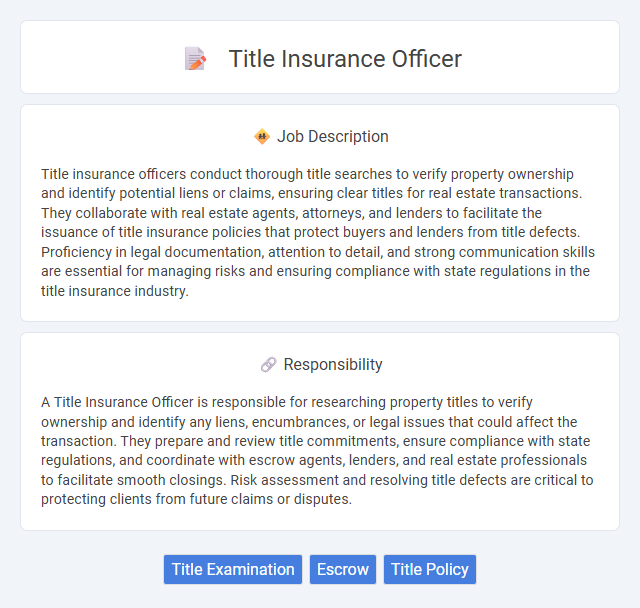
Title insurance officers conduct thorough title searches to verify property ownership and identify potential liens or claims, ensuring clear titles for real estate transactions. They collaborate with real estate agents, attorneys, and lenders to facilitate the issuance of title insurance policies that protect buyers and lenders from title defects. Proficiency in legal documentation, attention to detail, and strong communication skills are essential for managing risks and ensuring compliance with state regulations in the title insurance industry.
Individuals who possess strong attention to detail and excellent organizational skills are likely to be well-suited for a title insurance officer role. People comfortable with analyzing legal documents and communicating clearly with clients and real estate professionals may find this job fitting. Those who prefer routine tasks and can manage multiple cases simultaneously might have a higher probability of thriving in this position.
Qualification
A Title Insurance Officer must possess a comprehensive understanding of real estate laws, title searches, and underwriting procedures, typically supported by a degree in business, law, or a related field. Strong analytical skills and attention to detail are crucial for verifying property titles, resolving discrepancies, and mitigating risks. Professional certifications such as a Title Insurance License or Industry-specific training enhance qualifications and career advancement opportunities.
Responsibility
A Title Insurance Officer is responsible for researching property titles to verify ownership and identify any liens, encumbrances, or legal issues that could affect the transaction. They prepare and review title commitments, ensure compliance with state regulations, and coordinate with escrow agents, lenders, and real estate professionals to facilitate smooth closings. Risk assessment and resolving title defects are critical to protecting clients from future claims or disputes.
Benefit
Title insurance officers likely benefit from stable employment in the real estate sector, offering a consistent demand for their expertise in property title verification and risk assessment. They might enjoy competitive salaries combined with opportunities for career advancement within insurance and legal frameworks. Access to comprehensive training and professional development programs probably enhances their skills, increasing job security and long-term earnings potential.
Challenge
A Title Insurance Officer likely faces the challenge of thoroughly examining property titles to identify potential legal issues or liens that could jeopardize coverage. Navigating complex regulations and ensuring compliance with state and federal laws may require meticulous attention to detail and continuous education. Balancing client expectations with risk management procedures could also present ongoing difficulties in this role.
Career Advancement
Title insurance officers play a crucial role in verifying the legal ownership of properties and resolving title issues to facilitate smooth real estate transactions. Career advancement opportunities often lead to senior underwriter positions, managerial roles, or specialized fields like commercial title insurance. Gaining professional certifications such as the Title Insurance Underwriter Certification (TIUC) and developing expertise in state-specific title laws significantly enhance promotion prospects and salary growth.
Key Terms
Title Examination
Title insurance officers specialize in title examination, meticulously reviewing public records, deeds, and liens to verify property ownership and identify potential legal issues. Their expertise ensures the accuracy of title searches, preventing claims and disputes that could arise after property transactions. Proficient title examination supports the issuance of reliable title insurance policies, safeguarding buyers and lenders from financial loss.
Escrow
A Title Insurance Officer specializing in escrow manages the secure transfer of property titles and funds between buyers and sellers during real estate transactions. They coordinate with lenders, real estate agents, and attorneys to ensure all escrow conditions are met, facilitating a smooth closing process. Expertise in escrow regulations and title examination protects clients from financial risks and title defects.
Title Policy
A Title Insurance Officer plays a critical role in verifying property ownership and ensuring clear title for real estate transactions. They meticulously review public records, identify potential title defects, and facilitate the issuance of Title Policies that protect buyers and lenders from financial loss due to title disputes. Expertise in interpreting title commitments and managing endorsements is essential to safeguard stakeholders throughout the closing process.
 kuljobs.com
kuljobs.com